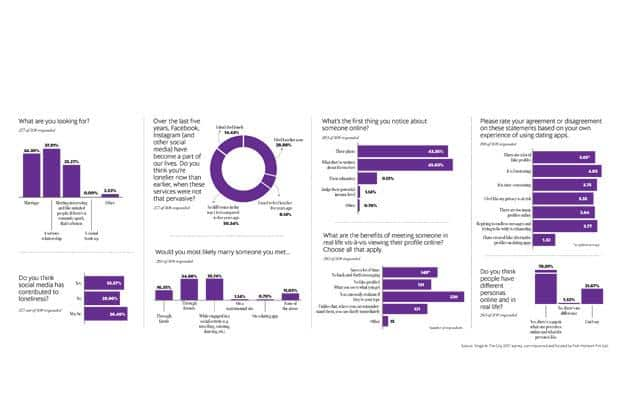Single in the city
Urban millennials trust the Internet enough to sign up on dating platforms, but prefer to find their life partner in an offline curated event

Ashish, a 36-year-old Bengaluru resident who wished to be identified by his first name only, knows the type of woman he would like to marry: “a working professional with her own ambition to pursue". On a January weekend, he flew down to Mumbai to party with other singles on a yacht. Like him, they were urban, working professionals, looking to settle down, but not settle. They sailed and then mingled over drinks at a gourmet restaurant near the Gateway of India. A few exchanged numbers, some showed interest in meeting again. For many, it was a Sunday well spent.
The marketing professional says that it’s only at events like these that he is likely to meet someone with whom he could have a “potential long-term relationship"—in a space curated with other like-minded individuals. The event was organized by Floh, a Web-based, technology-driven platform that describes itself as a community of singles, not a dating application. On Floh, members can even organize their own events and form communities based on shared interests, such as rock-climbing or cooking.
In urban India’s dating scene, there are already a handful of services which, though Web-based, focus on offline events rather than on matching people through algorithm or location, as applications like Match.com or Tinder do. Footloose No More is another such Web-based service in India which organizes meetings for singles. Sirf Coffee, meant for the “global Indian professional", according to executive vice-president Naina Hiranandani, promises its members at least four to six personalized one-on-one dates in a six-month period.
Also Read: Caught in the net
Aashish, who is on Tinder, Woo and Sirf Coffee, is hopeful, but the jury’s out on this one. Can we aspire to find the right life partner, with the emotional intelligence and empathy we crave, in a digital age that generates shorter attention spans, less personal interaction, and shrinking space for an exchange of authentic emotions?
We reached out to Siddharth and Simran Mangharam, co-founders of Floh, who conducted a survey among some of their members on the experience of finding love and fulfilling relationships both online and offline. The survey, done last month, had 308 respondents, 85% of whom were Floh members. The remaining were friends and acquaintances of members. All respondents were aged 25-40 and lived primarily in either Delhi and the National Capital Region, Bengaluru or Mumbai.
The survey revealed a mistrust of the online space. To a question on whether people have different personas online, nearly 77%, of the 263 respondents agreed that there was a gap between what people are like in real life, and what they present themselves as online.
Mira Saraf, a 36-year-old Mumbai-based businesswoman, has met more than 30 people since 2015 through Tinder, TrulyMadly, Floh and Aisle. “My struggle with online-dating apps is that when you see an online profile, you’re only seeing what they want you to see."
Saraf says this often leads to the creation of a false set of expectations, which then needs to be handled with caution. She narrates an incident, with someone she met on a dating app recently. “He had come to Bombay for three weeks, and asked if we could meet. Since he lived in another country and I was not up for a long-distance relationship, I told him I would be happy to meet, but only as friends. We kept in touch through messages, but when he kept insinuating that we should be more than friends, I was no longer interested in meeting him, and told him as much. After some days, he pinged saying he might have met the right person (in me). How could he have felt that after one or two weeks of texting? We hadn’t even met."
In comparison, Saraf enjoys the community meetings organized by Floh, especially those that are activity based. She has also gone on to seriously date two men whom she met at these events.
Shyam Bhat, author of How To Heal Your Broken Heart: A Psychiatrist’s Guide To Dealing With Heartbreak, and founder of Seraniti.com, an online counselling service, pins the mismatch of expectations on the digital medium. “Authentic relationships need real-time communication, which allows a constant exchange of emotional information. But, like capitalism, technology also functions on the principle that time is a scarce commodity, which leaves little space for authentic communication," he says.
But there are more serious implications to having interactions that are perpetually online, says Bhat. Taking the example of trolling, he says, “On social media, people don’t see the other person as a complete emotional being and the more time we spend in this virtual world, we lose out on developing emotional intelligence and empathy that come from nourishing real relationships. That’s why social media often leaves us feeling hollow, lonely and anxious."
As the graphs reveal, the experience of those looking for love online is a fraught one, given that social interactions over the Internet are fast changing shape and tenor from what we have grown to expect. Like any good romance, it’s a story that’s still unfolding.
Survey highlights
308 respondents, men and women, aged 25-40, from Delhi, Mumbai and Bengaluru
-
FIRST PUBLISHED10.02.2017 | 08:26 PM IST
-
TOPICSFloh | Online dating | Dating apps | Snapchat | Twoly Madly Deeply | Tinder | Love | Valentines Day | mint-india-wire
- For all the latest Fashion News, Lifestyle News, Food News, Smart Living, Health Tips, and Relationships, only on Mint Lounge.

